This Artist Colorizes Old Photos, And They Might Change The Way You Perceive History
Categories: Art | Design and Architecture | History | People | Photo project | Society | Technology | World
By Vika https://pictolic.com/article/this-artist-colorizes-old-photos-and-they-might-change-the-way-you-perceive-history.htmlNowadays, we carry some sort of photography equipment with us every day, and even the worst phone camera is way more advanced than the ones used in the 1900s. To revive those vintage black-and-white images, Sebastien de Oliveira has been colorizing them and giving them new appeal and interest.
Previously, Sebastien shared a bit about the complexities of his colorizing technique: “Let’s say that I observe a lot how the light works on objects—the reflections, the transparency, the temperature of the light—and all the different interactions between them, and I've found a technical way to reproduce them. The system involves colorizing not only each different object but also the different grays that compose each object."
We can only wonder what the future generation will do to update our photos to make them feel more alive, but for now, let's take a look at the colors hiding behind the photos of the past.
More info: Instagram
10 PHOTOS
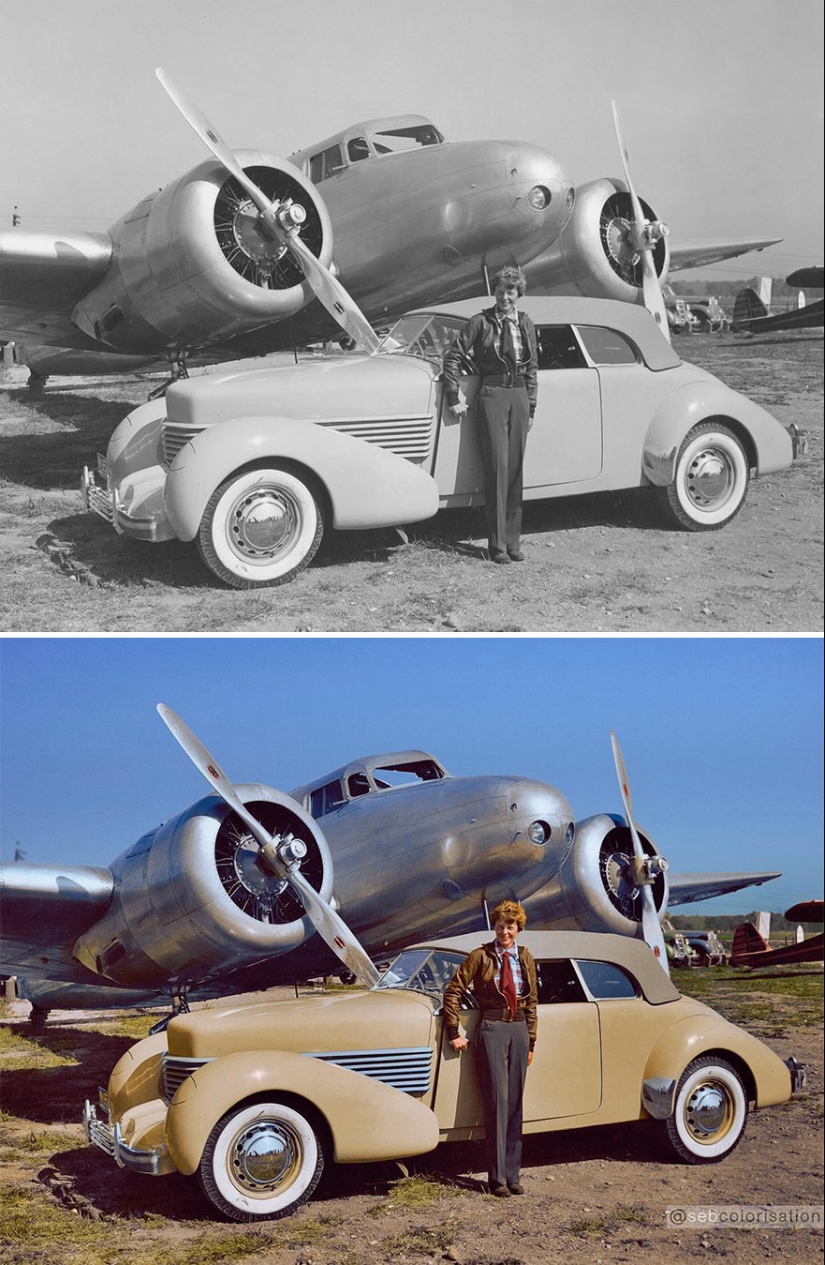
#1 Amelia Earhart With Her Cord 812 Phaeton Car And Her Lockheed Airplane, 1937
Pictolic once again reached out to Sebastien, who kindly answered our questions about colorizing vintage photos.
Sebastien shared what inspired him to specialize in this craft, considering the enduring popularity of black-and-white photography. “I will always love the black and white photography, I practiced the print in my youth and I loved it. I discovered the fascination of colorization late in my life and what is so addictive for me is the time-traveling effect, how a colorized photo can make you live the experience of observing an image in a different way, closer to our own lives. I love the challenge of finding harmony between the choices of colors, the lighting effects, and the interaction between the colors. The game is infinite,” wrote the artist.
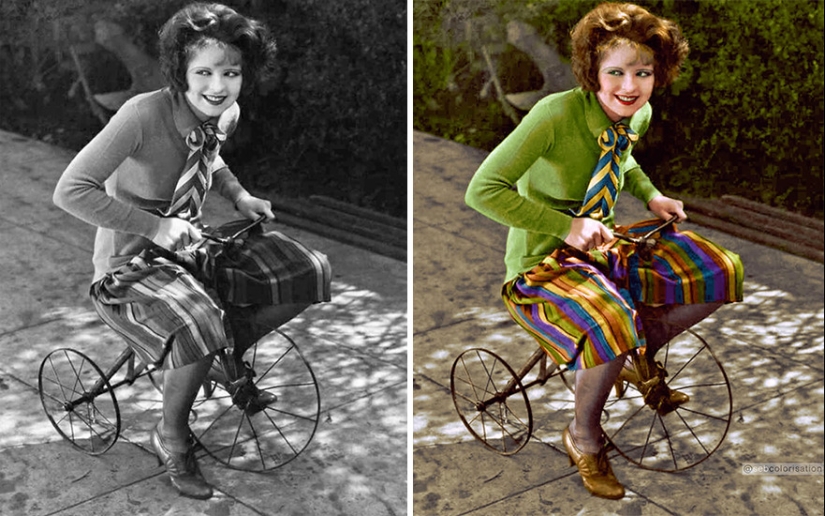
#2 Actress Clara Bow Photographed In 1927
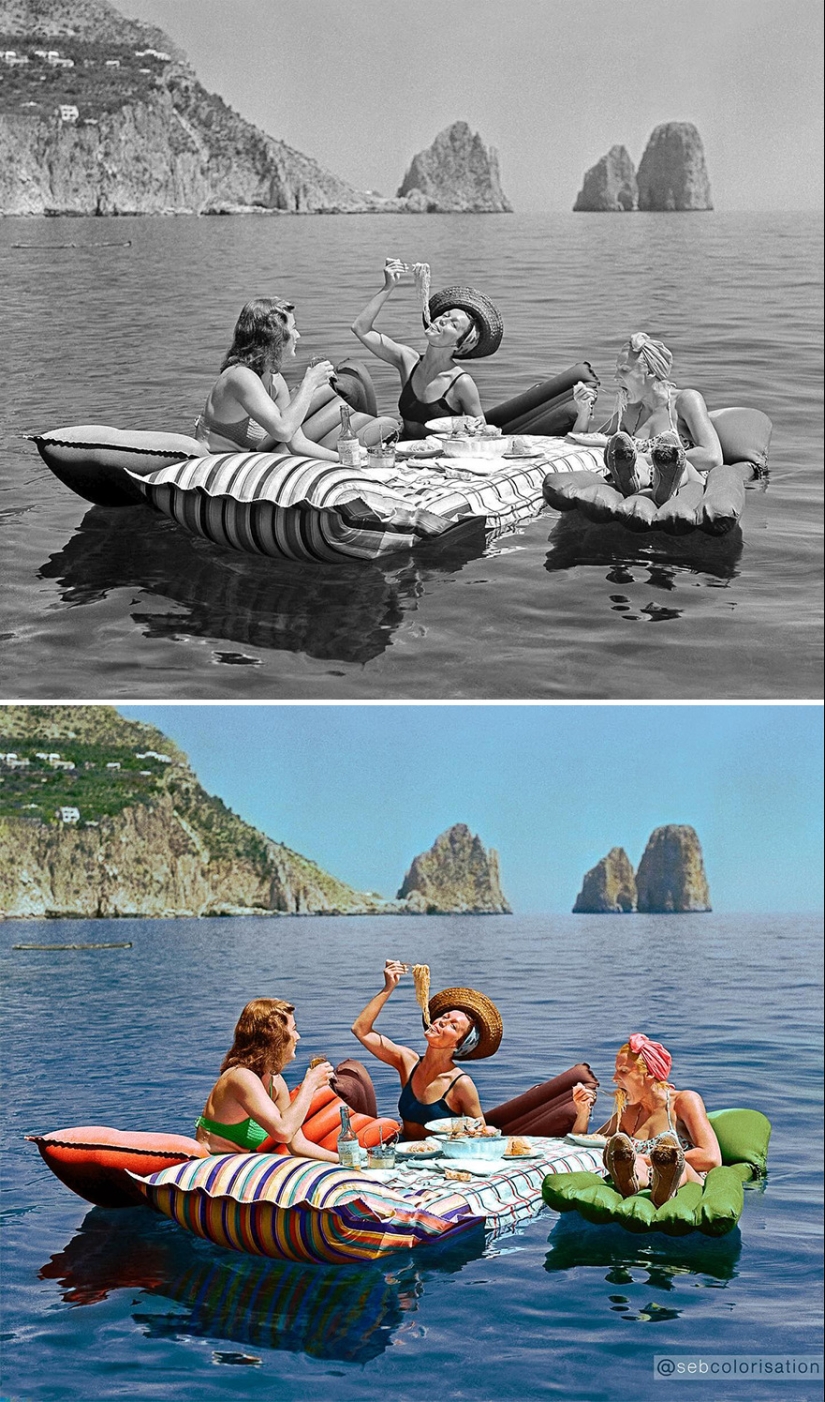
#3 Three Women Eating Spaghetti On Inflatable Mattresses At Capri, 1939. Photographed By Hamilton Wright
Sebastien also described his creative process when approaching a new project like colorizing images from the 1924 Olympic Games for his recent book and exhibition.
“My book is about Paris in the twenties and I must say that I took it as a challenge because my favorite period of time for coloring was the ’40s or the ’50s. My first book Back to America was all about the saturation of the technicolor and sometimes the exaggeration of vivid colors. For the second and for the Olympic Games project, I needed to change my color chart. I had less references for my own town than for the American images! I had to adapt my color palette to this era. I calmed down the saturation and found some more subtle ways to colorize. Maybe more realistic but without betraying my love for vivid colors,” explained Sebastien.
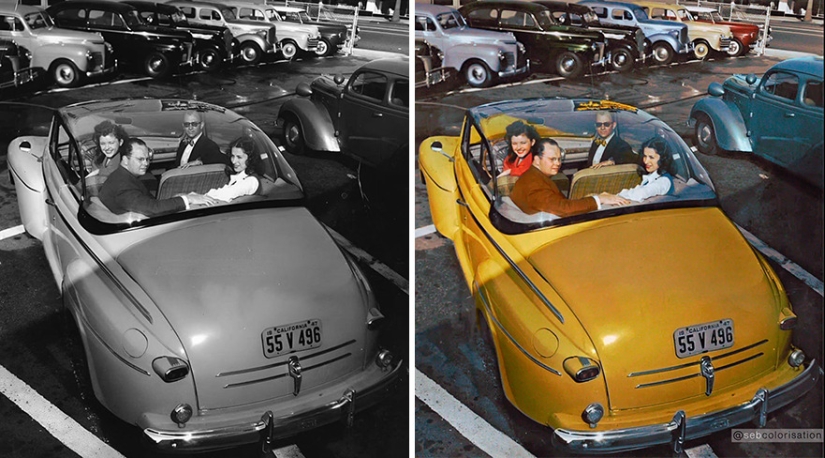
#4 1947 Ford Bubble Glass Top
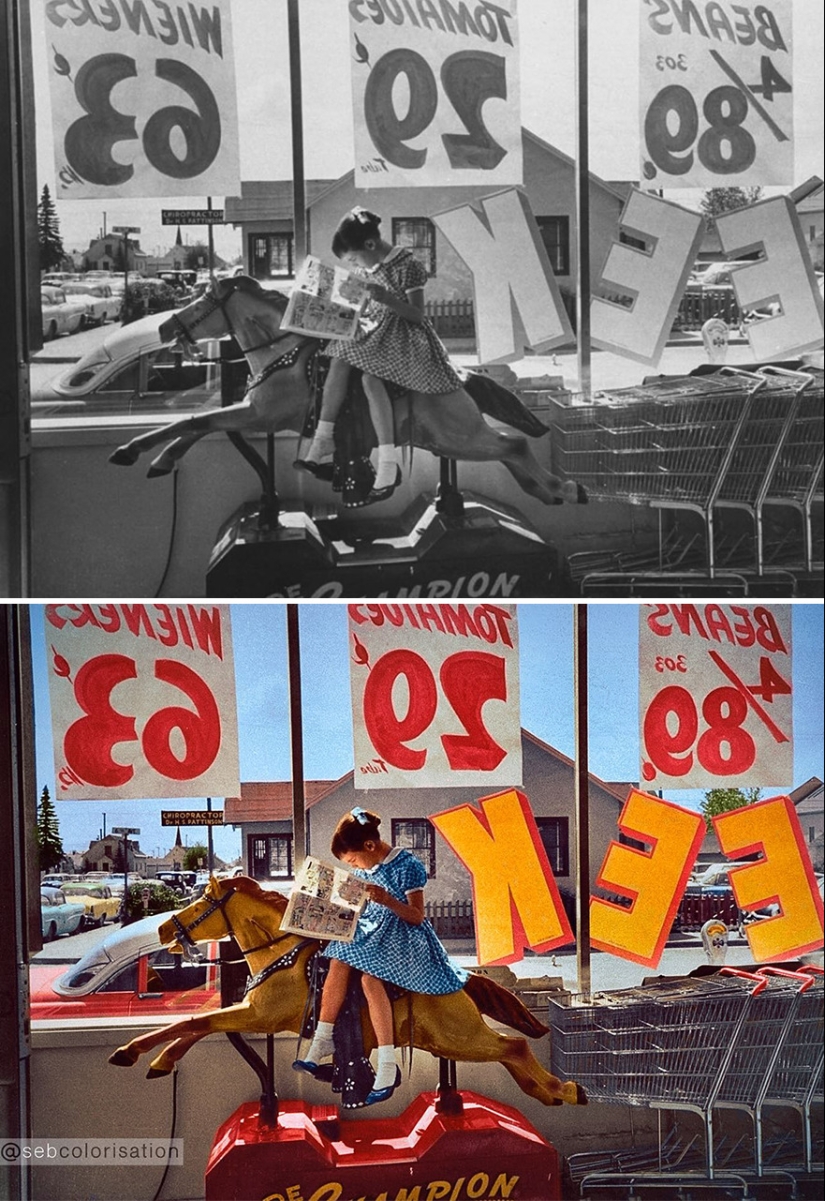
#5 A Young Girl Read A Comic Book At A Supermarket, Anchorage, Alaska, 1958
Sebastien also commented on the topic of ensuring historical accuracy while adding color to old photographs.
He wrote: “I would not say that I search for historical accuracy because it is quite a vain search, I prefer the concept of credibility, I make choices trying to give you the impression that it was the right one. I looked at the autochromes in particular, searching for inspiration, as well as paintings and drawings from the period. It is difficult to find confirmation of a choice, what you find is more a range of possibilities but you always need to assume your choices.”
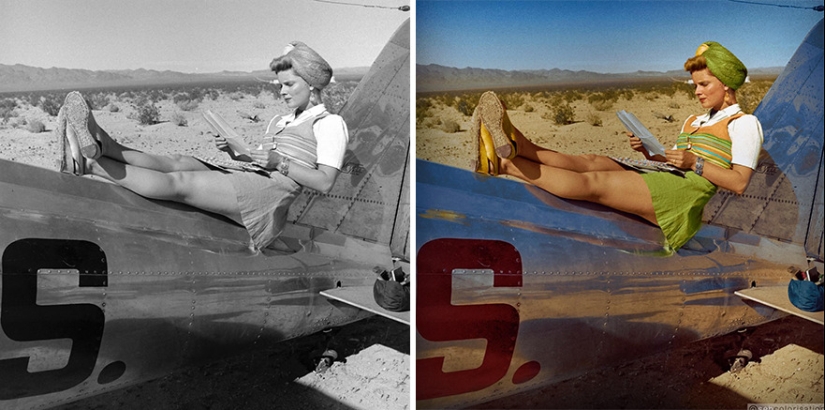
#6 Civil Air Patrol Student, Taking A Sunbath At The Silver Lake Airfield, Baker California, 1944
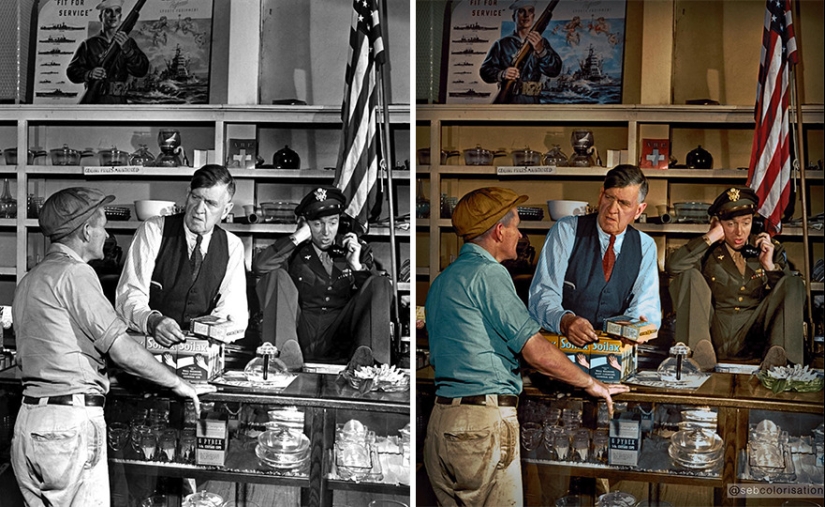
#7 James Stewart On The Phone At His Father’s Hardware Store, 1945. Photographed By Peter Stackpole
We were wondering what challenges Sebastien has faced in digitally enhancing these vintage images, and how he overcomes them to maintain the integrity of the original photographs.
“The bigger job in the process can be to clean and restore the old images before beginning to colorize them, it gives me plenty of time to think about the colors. The second biggest challenge is to choose the color of the clothes because it’s the main interrogation we can find. A crowd will be more difficult but maybe only because it will be longer to work on,” wrote Sebastien.
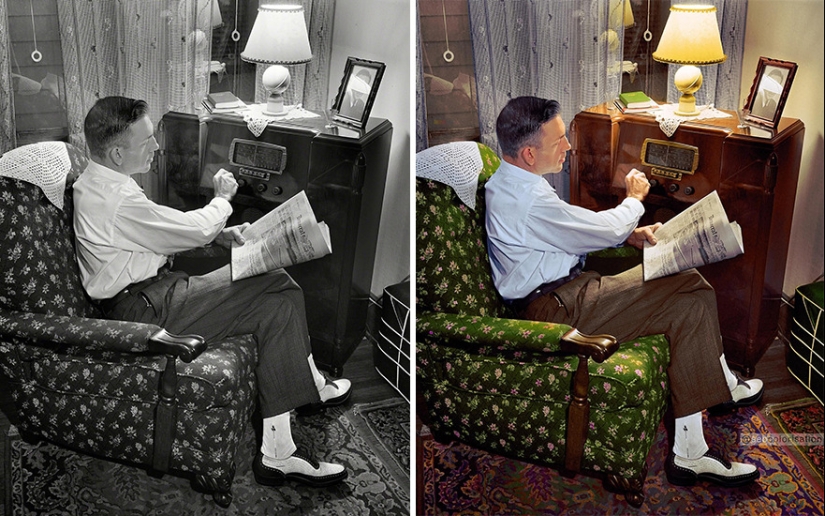
#8 Rochester, New York. "Mr. Babcock Tuning In For War News." September 1942 Photo By Ralph Amdursky
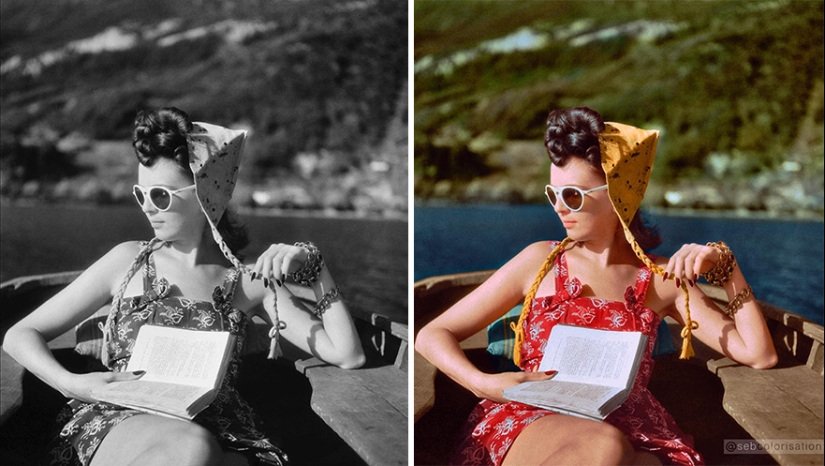
#9 Florette Reading On The Annecy Lake, 1943. Photographed By Jacques Henri Lartigue
Sebastien’s work often bridges the gap between artistry and historical preservation. We asked the artist to share how he balances artistic interpretation with the need to respect the authenticity of the original scenes he colorizes.
“I give myself a lot of freedom working on images as I can crop some parts or change the contrast of the black and white images, I think of the image as a raw material I can work as I want because the result will be my own interpretation, my version of the original, as someone can make a film from a book and feel free to change some parts.
I don’t consider my colorized photo better as the original, the original is still available and I didn’t replace the original with my version. So I prefer thinking of my colorization as a reconstruction of a certain reality and, because I see them also as paintings, I want them to be seen also as an art piece. The balance between the artistic and the credibility as color photo is something challenging to achieve, I am always trying new ways to find it.”
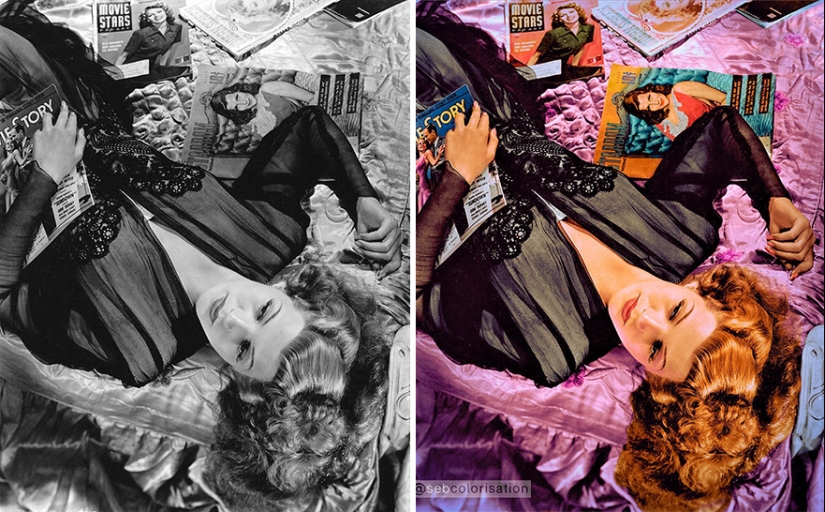
#10 Rita Hayworth, Photographed In 1941 By George Hurrel
Keywords: Old photo | Photo colorizing | Perceive history | Photo history | Historical photos | Artists
Post News ArticleRecent articles

It's high time to admit that this whole hipster idea has gone too far. The concept has become so popular that even restaurants have ...

There is a perception that people only use 10% of their brain potential. But the heroes of our review, apparently, found a way to ...

New Year's is a time to surprise and delight loved ones not only with gifts but also with a unique presentation of the holiday ...